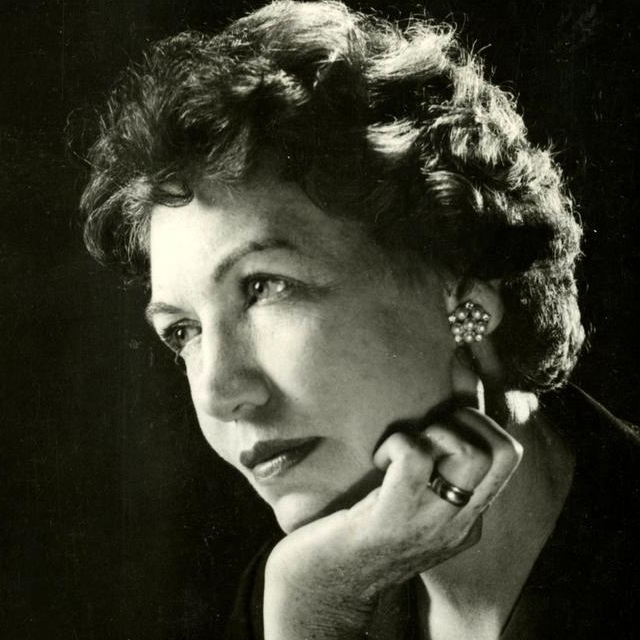Pulitzer Prize-winning poet, essayist, humor writer, and teacher Phyllis McGinley was born on March 21, 1905, in Oregon, and then lived on a ranch in Colorado until she was twelve, when her family moved to Ogden, Utah, following the death of McGinley's father. (These moves and the accompanying isolation, with sporadic schooling and lack of libraries, would greatly shape McGinley's later appreciation of domesticity and stability.) She studied first at the University of Southern California and then the University of Utah, where she graduated with her bachelors in English in 1927. Following graduation, she taught in Ogden and then in New Rochelle, New York, before moving to New York City to support her career as a writer. Now in Manhattan, she worked various jobs—including as an advertising copywriter and the poetry editor for Town and Country—before marrying business executive Charles Hayden and moving to a house in Larchmont, New York. Here the couple would raise their two daughters, entertain friends, and build a comfortable life for themselves, which would last until Hayden's death in 1972, when McGinley had to sell their beloved house and move back to Manhattan.
McGinley wrote her first poem at six years old, and would continue writing poetry for the remainder of her career even as she also branched into other genres, including essays, nonfiction, humor, and lyrics for musicals. Over the course of her career McGinley wrote twelve collections of poetry, one of which – the 1960 Times Three —won a Pulitzer Prize for poetry in 1961, the first time this award had been given to a collection of light verse. In addition, many of McGinley's essays can still be found today archived at The New Yorker, while much of her nonfiction went through multiple editions and some of her children's books were included in the popular Little Golden Books series.
While McGinley became best known for her light verse, which focused mainly on the milieu of middle-class suburban life in America, her poetry also drew substantially from the times surrounding it. Her first two collections drew some of their themes from the Great Depression, and others from the changes in her personal life as McGinley married Hayden, settling into a more comfortable, steady life herself. Later collections also dealt with fear and loneliness on the home front in the shadow of World War II. Even McGinley's depictions of suburban life, a comfortable state that she treasured, were not solely celebratory. Instead, much of her work was also quick to acknowledge that home-making could be monotonous, drudging work, and that the much-vaunted heterosexual relationship of breadwinning husband and home-making wife could easily be strained. Humor, irony, and rhyme became her means of acknowledging both the positive and the negative sides of this life, and she brought these hallmarks into her work in other genres too.
McGinley began writing children's books three years after the birth of her second daughter and would eventually produce about twenty titles for young readers, who she believed needed exposure to more complex vocabulary and moral lessons in order to aid their development. She also turned to essays and other nonfiction forms with increasing frequency, producing a hagiography, a memoir, and several articles for magazines including Ladies' Home Journal, Good Housekeeping, and Saturday Review. She quickly developed an anecdotal style and approach, but even her prose language resembled the light-hearted approachability of her poetry. A devout Roman Catholic, McGinley had a complicated relationship with second-wave feminism, both appreciating the need for women's rights but also disapproving of how, in her eyes, many proponents of women's equality focused largely on "wrongs" instead.
McGinley's versatility and accessibility as a writer garnered her many awards. Besides the 1961 Pulitzer for poetry, she also received a Spirit Gold Medal from the Catholic Poetry Society of America in 1962 and a Laetare Medal from the University of Notre Dame in 1964. Beyond poetry, too, her children's book Wonderful Time was recognized as one of the New York Times' Best Illustrated Books of the Year in 1966, and her edited collection of poetry Wonders and Surprises was named one of 1968's Books of the Year by the Child Study Association. McGinley also received honorary degrees from several American colleges and universities, including Dartmouth (1961), Boston College (1962), and St. John's University (1964).
McGinley died of a stroke on February 22, 1978, in Manhattan.
Bibliography
Poetry:
- Confessions of a Reluctant Optimist, Hallmark Editions, 1973
- Wonders and Surprises: A Collection of Poems (editor), Lippincott Williams and Wilkins, 1968
- A Wreath of Christmas Legends, The Macmillan Company, 1967
- Mince Pie and Mistletoe, J.B. Lippincott, 1961
- Times Three: Selected Verse from Three Decades, Secker & Warburg, 1960
- Merry Christmas, Happy New Year, The Viking Press, 1958
- Love Letters, The Viking Press, 1954
- Stones from a Glass House, The Viking Press, 1946
- Husbands are difficult: Or, The book of Oliver Ames, Duell, Sloan and Pearce, 1941
- A Pocketful of Wry, Duell, Sloan and Pearce, 1940
- One More Manhattan, Harcourt, Brace, and Company, 1937
- On the Contrary,Doubleday, Doran & Company, 1934
Plays and Musicals:
- The Emperor's Nightingale (narration for translated film), 1949/1951
- Small Wonder(musical lyrics with Billings Brown), Broadway, 1948
- The Toy-Shop: A Musical Play In Three Acts, G. Schirmer Inc., 1928
Children's Literature:
- Farm Favorites (A Little Golden Book),Golden Books, 2012 (reissue)
- Kitty on the Farm (A Little Golden Book),Golden Books, 1990 (reissue)
- The Most Wonderful Doll in the World, Scholastic, 1990 (reprint)
- Wonderful Time, J.B. Lippincott, 1966
- A Girl and Her Room, Franklin Watts, 1963
- How Mrs. Santa Claus Saved Christmas, J.B. Lippincott, 1963
- Boys Are Awful, Franklin Watts, 1962
- The B Book: A modern masters book for children, Crowell-Collier, 1962
- Sugar and Spice: The ABC of Being a Girl, Franklin Watts, 1960
- Lucy McLockett, J.B. Lippincott, 1959
- The Year Without a Santa Claus, J.B. Lippincott, 1957
- The Make-Believe Twins,J.B.Lippincott, 1953
- A Short Walk from the Station, The Viking Press, 1951
- Blunderbus, J.B. Lippincott, 1951
- The Horse Who Had His Picture In The Paper, B. Lippincott Company, 1951
- All Around the Town, J.B. Lippincott, 1948
- A Name for Kitty, Golden Books, 1948
- The Plain Princess, J.B. Lippincott, 1945
- The Horse Who Lived Upstairs, J.B. Lippincott, 1944
Nonfiction:
- Saint-Watching, Viking Adult, 1969
- The Province of the Heart, Viking Press, 1959
- Sixpence in Her Shoe, Dell, 1965
Links
Phyllis McGinley Collection at Syracuse University

